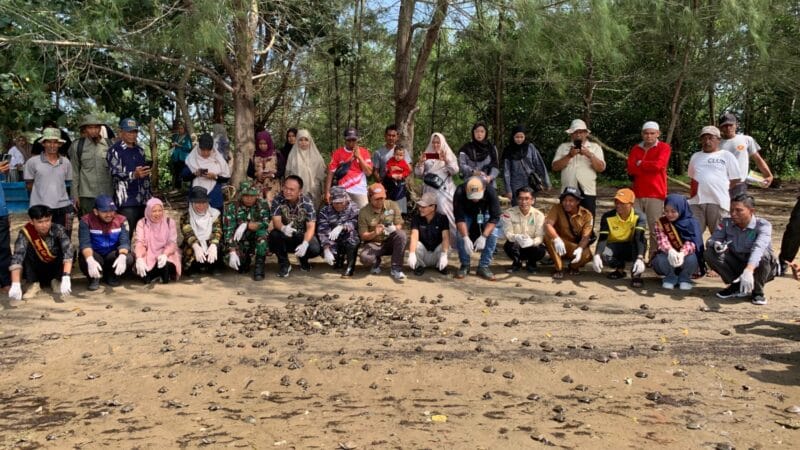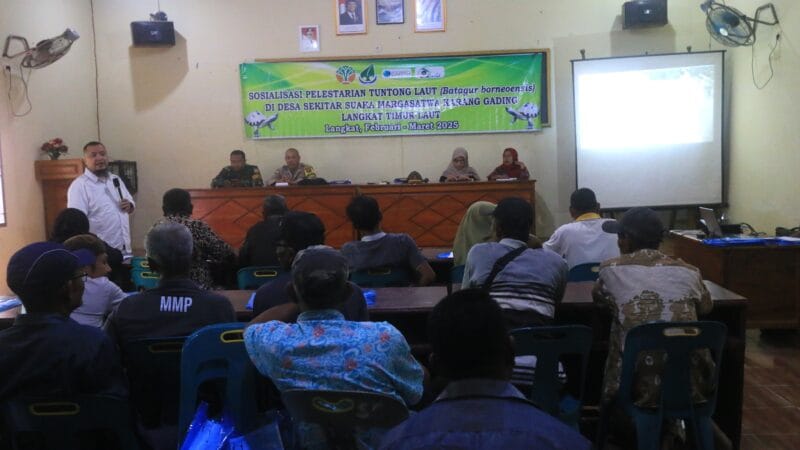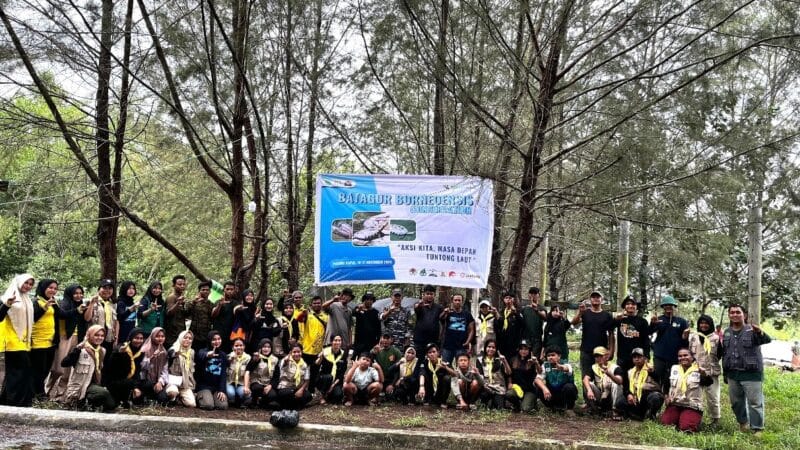Survey: 57.7 Percent of Students Did Not Know B.borneoensis is Critically Endangered
 A total of 57.7 percent from 90 students that as a sample of this survey do not know that Painted Terrapin is in critically endangered status. Also, 38.9 percent of students aged 12-17 years in Sub-district Seruway only ever heard that around of their village is live species Tuntong Laut (Batagur borneoensis). Not a few students, about 34.4 percent, who had never heard that this critically endangered animal living in Seruway. Only 26.6 percent of them stated had ever seen this animal.
A total of 57.7 percent from 90 students that as a sample of this survey do not know that Painted Terrapin is in critically endangered status. Also, 38.9 percent of students aged 12-17 years in Sub-district Seruway only ever heard that around of their village is live species Tuntong Laut (Batagur borneoensis). Not a few students, about 34.4 percent, who had never heard that this critically endangered animal living in Seruway. Only 26.6 percent of them stated had ever seen this animal.
Meanwhile, answering the question what will they do if they find a neighbor or someone selling or eating the egg, as much as 56.7 percent of respondents said that they would try to give advise to not to eat the eggs anymore; 23.3 percent said they would report it to environmental organizations; 5, 5 percent said they would report it to government officials; 8.9 percent said they would participate to eat; 27.8 percent of respondents said that they will not to do anything because that is not considered as their concern. Even, one of the respondents who gave answer that will taking a part to eat the eggs give a reason that he will doing that because it is common practice and is hereditary in the community. Nevertheless, overall of the students expressed interest and willingness to learn more and would like to getting involved to conservation efforts of this species.
The findings give illustration the insufficient knowledge of students – young generation – about the threatened extinction of this species. The results also indicate the potential for students to get involved in saving this species. This indicated by 56.7 percent of students who will try to give advice if they find someone who is consuming or selling the eggs. However, there are also challenges which indicated by 8.9 percent of students who will taking initiative to eat the egg and 27.8 percent which indicating apathy. This amount is can not be underestimated. Moreover, in the future, they are the younger generation who will make decisions about what kind of livelihood and lifestyle they will be build. Including the decision of whether to consume the eggs Tuntong Laut (local name for B.borneoensis) or not. In addition, connecting students to the government is also very important. Only 5.5 percent of students who will take the initiative to report the case to the government if they find the eggs sold or consumed. Of course this is not sufficient due to the government is the most responsible.
These findings are results from pre-campaign survey by Lembaga Satucita that involving 90 students as a sample of three schools in the Sub-district Seruway. The schools are First Secondary School (SMP / state-owned schools) Number 1 and Number 2 Seruway, General High School (SMA) Number 1 Seruway. Respondents are between 12 years to 17 years. Respondents are students that live in villages nearby of Seruway Mangrove Reserve – habitat of B.borneoensis.
Survey was carried out by giving a questionnaire to students to fill out. The average time needed to answer all questions – ten multiple-choice questions and two essay questions – about 20 minutes. The survey was conducted on Thursday (28 / 7) in three schools simultaneously.

Pre-campaign survey aim is to determine the level of students’ knowledge and awareness such as how to identify species B.borneoensis, the protection status and regulations, students’ attitudes toward preservation. The results of this survey also will be an input to preparing educational materials (the campaign) needed about preservation of Batagur borneoensis that will be implemented by the Lembaga SatuCita – supported by the Keidanren Nature Conservation Fund (KNCF) – in two secondary schools and one high school in Sub-district Seruway. In June 2011, placed in General High School (state-owned high school) Number 1 Seruway, Lembaga SatuCita has been conducted a FGD (Focussed Group Discussion) with teachers and another stakeholders to formulate the draft and key points that will be trained (educated) to students.
This survey is also a complementary of the FGD was done in June. This pre-campaign survey will provide feedback to Lembaga Satucita, from the students’ perception, what are they really needs to be included in the module to be trained to them. In addition, the survey is also important to be a baseline data in evaluating the effectiveness of the campaign that will be started in September – after ‘Idul Fitri (moslem holy day after Ramadhan).
After conducting a campaign, a similar survey also will be conducted to the 90 students as a sample – of approximately 600 students who will be educated and trained during the campaign. The result of pre-campaign and post-campaign survey will be compared to evaluate the results of campaign carried out. Are the campaign increasing students’ knowledge, attitudes and awareness to save Batagur borneoensis. Also, how much and how the increase occurred, as well as how to provide post-campaign engagement space to students. (Admin).


